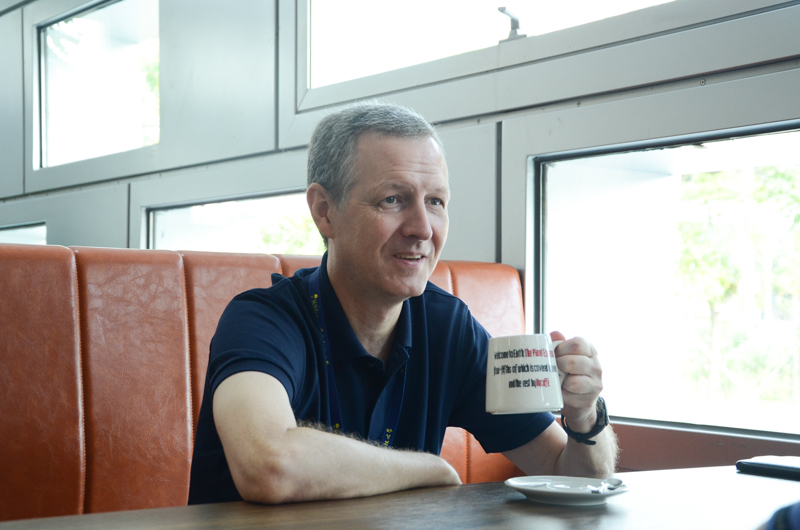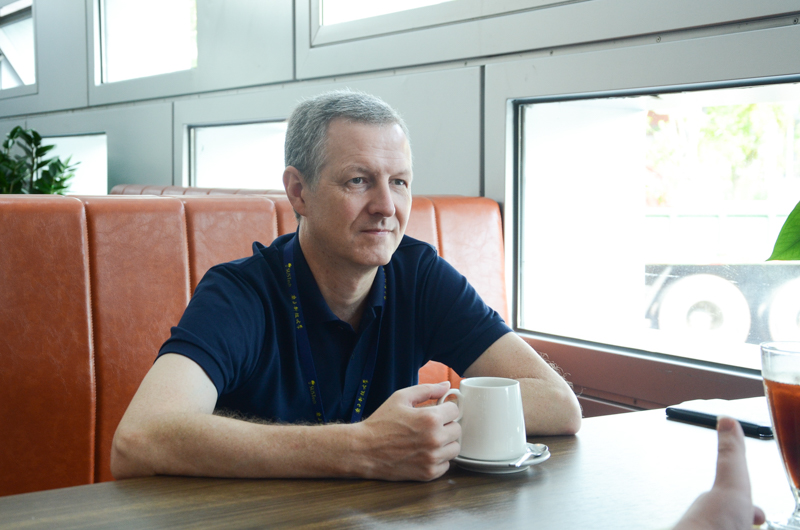One of the unique things about Southern University of Science and Technology (SUSTech) is that it’s one of the few universities in mainland China to offer an entirely English curriculum. To help students adjust to this new paradigm, the Center for Language Education (CLE) employs high-quality educators from around the world to teach students how to communicate in English at an academic level. The students are, to coin a phrase, bright-eyed and bushy-tailed in many of these classes, and this enthusiasm comes from our CLE teachers.
One of these lecturers is Albert “Al” Evans, who hails from Alabama in the United States. We sat down with him to talk about how he made his way to SUSTech, his interest in language and what else he wants to achieve.

Who is Al Evans?
Al’s home state has been Alabama since he was 12 and he is a proud graduate of the University of Alabama, where he majored in communications. This public university in Tuscaloosa, Alabama is consistently a top 100 university in the United States. He later completed his master’s degree in Teaching English to Speakers of Other Languages at his alma mater.
In the midst of of his masters degree, Al traveled to Ibaraki Prefecture in Japan, where he was an Assistant English Teacher for the Hitachi Board of Education. This was his first experience in Asia.
Following his graduation from his Masters degree, Al’s Asian travels continued in mountainous Nepal with a Peace Corps Volunteer-Education Program. He then returned to Japan, teaching at Minnesota State University-Akita, Miyazaki International College and Kansai Gaidai University. After eight years in Japan he then returned to the University of Alabama as an Adjunct English Instructor within the Department of English.
His first foray into China came with a connection to the United States, with a two and a half year stint in Chengdu at the Sichuan University Pittsburgh Institute. He then arrived at SUSTech at the beginning of this academic year, where he has been working with our excellent faculty members within CLE.
TESOL wasn’t the dream, as far as Al explained. He really wanted to travel, and teaching language was a fantastic way to achieve that goal. “The only thing I was really interested in was traveling abroad. TESOL was a career path to do that. I wanted to work in another country, see foreign lands, meet interesting people.”
While traveling around Asia has been a massive benefit for him, SUSTech and Shenzhen became a major draw for him once he spent some time in China. “Once I mentioned to people in Chengdu that I was thinking about going to work in Shenzhen, people were really positive about me going there.”
Given his extensive travels through Japan, Al has been able to master conversational Japanese, and admits that while he once had conversational Nepali (the official language of Nepal), that has since dropped away.
How he spends his time on and off campus
Al has been working hard on a variety of projects. Among his regular classes, Al teaches academic writing, a skill that is particularly important for SUSTech’s engineering students. Among his personal projects, he is trying to work out how to get students podcasting. He believes that such a skill would encourage students to express themselves.
In his free time, Al is an avid explorer of Shenzhen’s vibrant life. He has spent time exploring the vast array of food and beverage options across Shenzhen, meeting many interesting people across the city. When he’s not spotted at one of Shenzhen’s many craft breweries, you can find him curled up reading a book. As a proponent of extensive reading, he believes it’s a fantastic way for students to pick up new vocabulary. In his case, he’s reading for pleasure from one of the hundreds of books on his e-reader.
What has Al Evans achieved and what does he want to achieve?
One way Al has achieved success was changing the way reading was taught at the University of Alabama’s English Language Institute. His work on extensive reading, also known as reading for pleasure, encourages large amounts of reading. It smoothes language acquisition and motivates students to learn new vocabulary through the inference of surrounding content. By allowing students to read at their own pace, they are able to enjoy reading, instead of feeling pressured to achieve something.
Al’s push to run this at different higher education institutions has not always been smooth, but ultimately has seen some success. He is most proud of how this program resulted in people getting free books in his home university of Alabama and adding to the library for language learners.
Students have picked up more new vocabulary and gained better understanding of the new texts. He also hopes to expand the size of the English language section of the Lynn Library, and he has worked with the librarians to find new books. “I talked with one of the librarians once a week about books that she might want to get to build up the English language collection.”
On a personal level, he always works hard to reduce the amount of ”teacher talk” in class, while maximizing the amount of talking students do with each other. This is something that is encouraged in language classes, as students feel more comfortable talking to each other, rather than the stress of trying to talk to their educator. Al is also working on a variety of science, technology, engineering and mathematics projects, in order to encourage students to speak up about their research and interests. He had not set any parameters for the students at the time of our interview, believing that the students should be able to select from a menu of options. He will be teaching the summer IELTS elective, since such courses are in demand for students who wish to study overseas.

Traveling and teaching never a smooth path
Al found that as a seasoned traveler, he had not experienced any significant faux pas. This has kept him in good stead with his employers in the past and present. In terms of what he wished someone had told him before he arrived in China, he wished that people had told him how hard international financial transfers could be. However, he did note how pleasant it was to find students not playing with their phones while he was teaching. “Once students come into the class, they leave their phones alone. They are really attentive, not playing games or texting or anything similar.”
Being away from family has not been a massive challenge for Al. He’s found that if he is happy with his work, he is happy in general. Unlike other faculty or staff from overseas, he hasn’t found himself craving food from home. With a desire to travel, he’s traveled to Sichuan, Beijing, Xi’an, Guilin and Guangzhou, as well as the occasional trip to Hong Kong. Al would like to travel to the western provinces, as well as Inner Mongolia.
Final thoughts for successful TESOL teachers
You have to keep learning. It will get you through lulls in your career. If you’re not having fun, you’re probably doing it wrong. Try different things to have fun again.
Proofread By
Photo ByStudent News Agency, Center for Language Education